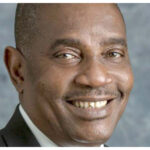
Flooding has become a recurring problem in certain areas, and the NSE believes that constructing additional dams can provide effective solutions to mitigate the impact of floods.
The President of NSE, Tasiu Gidari-Wudil, made the call at a press briefing in Abuja on Monday.
The PUNCH reports that the Director of the African Affairs, Federal Ministry of Foreign Affairs, Umar Salisu, said in a letter dated August 21, 2023, that the ministry received a note from the High Commission of Cameroon as regards the opening of the dam.
The letter, which was addressed to the National Emergency Management Agency, read in part, “I have the honour to inform that the ministry is in receipt of a Note Verbale from the High Commission of the Republic of Cameroon informing that Cameroonian officials have resolved to open the flood gates of the Lagdo Dam on the Benue River in days ahead due to the heavy rainfall around the dam catchment area in Northern Cameroon.”
Speaking at the event, Gidari-Wudil noted that construction of the dam should be a priority while also calling for the dredging of major rivers to reduce siltation and sedimentation.
He said,”Floods are among the most devastating natural disasters in the world, claiming lives and causing damage to properties and infrastructure.
”In Nigeria, flood affects and displaces more people than any other disaster every year.
“After the 2012 flooding incident, several committees were set up by governments at the federal level and the respective states affected by the flood.
”Also in November 2022, the Federal Government inaugurated a Presidential Committee on flood disasters. The mandate of the committees was to conduct research and develop comprehensive action plans for preventing flood disasters in Nigeria.
”As it stands today, the recommendations of studies conducted by the committees are yet to be fully implemented.”
He further called on the government to enforce existing policies and initiate legislation to protect the environment from the activities of man, occasioned by industrialisation and urbanisation as well as climate change.
On the incessant building collapse in the country, Gidari-Wudil attributed the persistent occurrences of building collapses across the country to the private sector’s involvement, accusing them of undermining building standards by employing unqualified individuals in the construction process.
He added, “If you take the statistics of building collapse in the country in the last 20 years, government buildings involved in collapse is just 10 per cent, it is private sectors that are compromising.
”That is why government projects are more expensive because they make use of professionals but in private projects, the prices are usually beaten down and as such will employ the services of someone who is not an engineer. In all building collapses in this country, only a few of these incidences involve our members and once we know, they are sanctioned.
”For example, in the Ikoyi building collapse, about three engineering companies worked out on that project. At NSE, we usually investigate all engineering failures and that is the way to go,” he said.
Speaking on the ministerial appointments, the NSE boss said President Bola Tinubu appointed three engineers in his ministerial portfolios, adding that the number was grossly inadequate considering having eight engineering-based ministries.
He further called on Tinubu to increase the number in future considerations saying “We hold the strong conviction that only engineers will function optimally in engineering ministries.”
Speaking on petroleum subsidy removal, he said that as much as the society supports the removal, adequate measures were not put in place to mitigate the effects on Nigerians. The NSE president also said that the society had aligned itself with the Federal Government’s National Digital Economy Policy and Strategy to establish an innovation hub that would become the “Silicon Valley” of Nigeria in the near future.
“As the world progresses into the era of the 4th Industrial Revolution (4IR), we have envisioned the NSE Smart Innovation Hub as a catalyst for a digital Nigeria, aligning with the federal government’s National Digital Economy Policy and Strategy.
”Realising that a SMART office project is a growing concern that requires time and continuous improvement, I have set up a trustee to undertake all it takes to bring the project to full attainment.
”However, I am happy to announce to you that we have reached an appreciable stage and by the grace of God, the ‘NSE SMART INNOVATION HUB’ will be officially launched on Wednesday, September 13, 2023,” he said.
He added that the hub would serve as a centre for research and development on technology and innovation challenges and for improving the business, noting that the hub would be a model to impact positively on the economic and technological development of the country.
He said it would also include an Artificial Intelligence, Internet of Things, Laboratory, Automation and Engineering Laboratory, Virtual/Physical Offices and e-Library.





